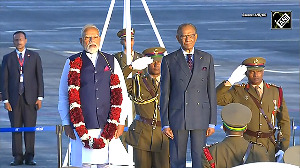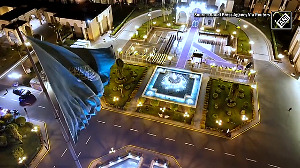Pakistan President Pervez Musharraf has said it will be difficult for him to work with former premier Benazir Bhutto as she is confrontational and producing 'negative vibes'.
Defending his declaration of emergency on November 3, the military ruler said the measure would not interfere with the holding of free and fair elections. He added that he could not set a date for ending the emergency as demanded by the world community, including the United States.
In an interview with The New York Times, Musharraf complained about Bhutto's conduct since her return to Pakistan a month ago.
"You come here supposedly on a reconciliatory mode, and right before you land, you're on a confrontationist mode. I am afraid this is producing negative vibes, negative optics," he said.
Bhutto returned from eight years in self-exile after Musharraf issued an ordinance to grant her amnesty in graft cases and to pave the way for further parleys between them on a possible power-sharing deal.
On Tuesday, Bhutto urged Musharraf to quit as president and said that she would never serve with him in any future government. She had been put under house arrest to prevent her from taking part in the Long March organised by the Pakistan Peoples Party.
Asked when the emergency would end, Musharraf said: "I don't know, I don't know. We need to see the environment."
The general was critical of Bhutto, saying she would be difficult to work with. He said she was under house arrest because she had accused Punjab Chief Minister Chaudhry Pervez Elahi of plotting against her. Thus, Bhutto was grounded to prevent an incident that she could then blame on the government, he said.
Musharraf, who has received US$ 10 billion from the US administration, most of it for the military, asked for more support and more patience from the international community. He said the Pakistan Army had limited resources in combating terrorists.
"Ten days back, of the 20 Cobra helicopters, we had only one that was serviceable," he said, adding "We need more support."
The Cobra gunships were supplied by the US for the Pakistan army's campaign against Taliban and al-Qaeda militants in areas bordering Afghanistan.
Musharraf said the army had regrouped in North and South Waziristan, where the force faced the strongest challenge from militants whom he called a 'vicious enemy'.
"Now, wherever the disturbance, we will strike very, very strongly," he said.
He added that nearly a dozen independent television news channels that had been closed under the emergency would be allowed to re-open if they agreed to a government code of conduct.
Asked why human rights activist Asma Jehangir, who heads the Human Rights Commission of Pakistan, was arrested when she attended a meeting at the commission's headquarters on the first day of the emergency, Musharraf replied, "Because she was agitating and trying to disturb the peace."
He called Jehangir, one of Pakistan's first women lawyers, "quite an unbalanced character" and criticised her for being too ambitious in her agenda to achieve better rights for women.







 © 2025
© 2025